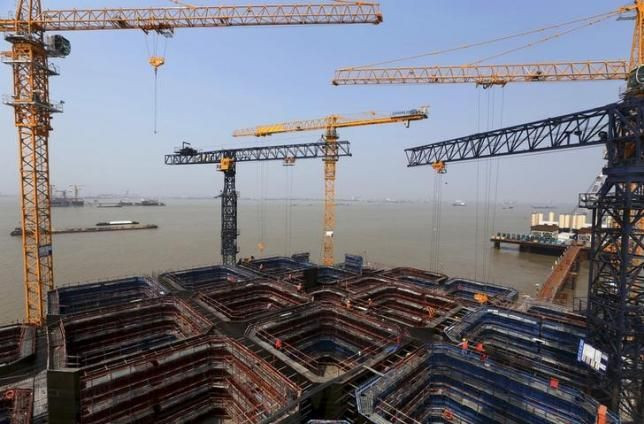Reforms At Risk As China Eyes 2020 Growth Goal

China looks likely to target annual growth of about 7 percent in its next five-year plan so it can hit ambitious 2020 goals, raising concerns that politics could trump a commitment to disruptive reforms entailing slower but more sustainable growth.
Many economists already think 2015 growth will miss that mark - the IMF expects 6.8 percent followed by 6.25 percent in 2016 - but Beijing needs average growth of close to 7 percent to hit a previously declared aim of doubling gross domestic product and per capita income by 2020 from 2010.
The National Development and Reform Commission (NDRC), the country's top planning agency, has been soliciting recommendations from think-tanks and policy advisers, which are divided into those advocating a lower growth goal of 6.5 percent for the five-year period and those recommending 7 percent.
"The goal of doubling GDP will be a hard constraint, which will make it difficult for the government to set a lower target," said a researcher with the NDRC.
The leadership will discuss the country's 13th five-year plan - a blueprint for economic and social development between 2016 and 2020 - at a party meeting in the autumn, according to sources involved in the internal policy discussions.
"A 7 percent target could be accepted by all sides," said a senior economist at a top government think-tank.
"It's more of a political issue than an economic issue," the economist said.
There have already been some signs that Beijing is open to flexing its push for reforms where they threatened growth; it put pressure on banks to help out when its preferred market solution for local government borrowing looked likely to lead to a funding crunch. It rowed back on a clampdown on opaque local government financing vehicles for the same reason and relaxed rules on phasing out some market-distorting tax breaks when their immediate withdrawal might have led to lower investment.
"Growth cannot be too low," said an influential economist who advises the government. "Changes in the economic model and structural adjustment require a sound economic environment."
"INEVITABLE SLOWDOWN"
The Chinese Academy of Social Sciences (CASS), a government think-tank, expects China's potential growth rate to fall to 6-6.5 percent between 2016 and 2020 from an estimated 7.6 percent during the 12th five-year period (2011-2015).
If it is right about 2011-15, then annual growth of 6.5 to 7 percent through to 2020 would be enough to meet the 10-year target of doubling GDP.
But the economy's trajectory has slowed markedly. From annual growth of 9.3 percent in 2011, it hit 7.4 percent last year, and Beijing is targeting 7 percent this year, which would be the slowest in a quarter century.
Many private economists doubt government can keep that up for the next five years.
"We expect economic growth to be around 6 percent over the next five years," said Zhou Hao, an economist at ANZ in Shanghai. "It will be a surprise if they target 7 percent."
Finance Minister Lou Jiwei caused a stir in April when he warned there was a 50 percent chance China would slip into the "middle-income trap" in the next five to 10 years.
That refers to a fast-growing emerging economy that stagnates before becoming a high-income economy, often because it cannot transform from low-cost, export-led manufacturing to an economy driven by domestic consumption and services.
Lou said there must be reforms to avoid the trap, and deal with the rapid ageing of the population, the lack of flexibility in the labor market and high debt.
But some advisers think those reforms and a high growth rate are inconsistent, and that adjusting to slower growth now could be the path to higher income in the longer term.
"The next five years will be crucial for China to become a higher-income country. We could encounter problems such as slowing growth, widening income disparity and rising social tensions," said an economist at a well-connected think-tank.
"The trend of economic slowdown looks inevitable. There could be big pressures if we target 7 percent growth," he said.
© Copyright IBTimes 2024. All rights reserved.




















